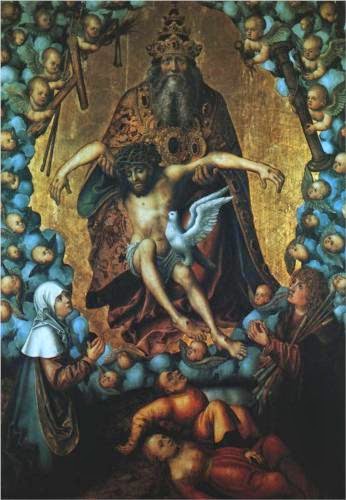 |
| The Trinity Cranach the Elder (1472-1553) |
This
Sunday is the only day in the whole Christian Calendar that is dedicated
to a theological doctrine rather than a person, event or sacred
symbol. Compared to other occasions, the Feast of the Holy Trinity
came to be observed rather late in the Church’s history and was not made
official until 1334. The intention was to conclude the liturgical commemorations
of the life of Jesus Christ and the coming of the Holy Spirit by focusing on
the whole nature of God. Trinity was taken up with particular enthusiasm by the
church in England, and so came to be specially identified with the Anglican
Church that resulted from Henry VIII's break with Rome in the 16th century.
The
doctrine of the Holy Trinity -- that
there are Three Persons in One God -- is
central to orthodox Christianity, and figures in confessions of faith
both at baptism and confirmation. At the same time, though we are asked to
affirm it, the doctrine is immensely difficult – perhaps impossible -- to understand
completely. How did Christians end up in the position of having to believe what they can hardly understand?
 |
| 'Mission to the World' JESUS MAFA |
The
answer is that as early Christians struggled to hold on to the essentials of
the Jewish belief in One God and acknowledge the full significance of
Jesus’ Resurrection, and explain their sense of
spiritual empowerment at Pentecost when the Risen Christ was no longer present to
them, they effectively stumbled on a formula. We owe its most familiar version – in the form of a blessing – to St Paul, who ends his Epistle for this Sunday with these words --“The grace of the Lord Jesus Christ, the
love of God, and the communion of the Holy Spirit be with you all”. But this
blessing simply reflects the “great commission” that Jesus gives his disciples in Matthew’s Gospel – “Go therefore and make disciples of all nations, baptizing
them in the name of the Father and of the Son and of the Holy Spirit”.
These
two very short lessons follow a much longer one, the first thirty five verses
of the Old Testament in which the creative acts of the sovereign God to whom we
owe our very existence are recounted. The heart of the doctrine of the Holy
Trinity lies in this thought: the awesome majesty of the God who made us is the
very same reality that we encounter in the humanity of Jesus and that we experience in the spirit that graces our daily lives. We may not know exactly how to
integrate them theologically, but all three ‘Persons’ are indispensable to
the ways in which Christians come to know and to love the one true God.
No comments:
Post a Comment